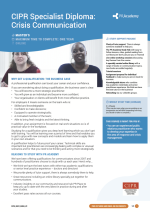
About this course
Learn about the different levels and impacts of crises, the building and maintaining of effective plans and the purpose and importance of crisis communication training. Discover how to use influencing strategies to avoid or avert a crisis. Join an online crisis scenario planning exercise run by your course leader Chris Tucker. As a former PR director in a global organisation Chris is a veteran of many crisis situations.
Our course includes live online sessions, tutorials and individual feedback on assignment topics.
Course detail
Study Support Package
Live interactive online workshops
One to one tutorials
Individual feedback on your assignment idea
Online library with all the books you need
Study Hub: our bespoke online learning centre
Networking via our LinkedIn group
Easy tutor contact
Pay monthly
Initial fee: £315.80 (incl. VAT)
6 monthly instalments: £290 (incl. VAT)
A one-off initial fee is taken when you enrol. Instalments are collected monthly from the date you enrolled.
How we calculate your fee
PR Academy tuition: £1,349 (+ VAT)
CIPR fees: £437 (no VAT)
Total: £1,786 (+ VAT)
VAT is calculated upon enrolment and is dependant on your location and situation.
VAT inclusive fee is £2,055.80

Who is this course for?
PR and communication practitioners. You are an experienced public relations practitioner who wants to develop your expertise in the area of response and crisis communication management. You want to prove your skill in the area of crisis communication management through certification.
Add a new skill. You may already hold the CIPR PR diploma or an undergraduate degree in PR or communication, but feel that gaining a specialism such as crisis communication management will enhance your CV and help you to fulfil your role.
Prepare or repair. You want to help your organisation to avoid a crisis or repair reputation after one had happened.
Master’s level. This is a Master’s level crisis communication course, so make sure you are ready to study and be assessed at this level.
Learning outcomes
Gain the knowledge and tools to contribute effectively to an organisation’s risk assessment, crisis preparations and management, while meeting what is expected of an ethical practitioner in complex situations.
Research and develop ethical crisis response strategies and plans that assist organisations to avoid or reduce the impact of crisis situations.
Learn what to do at each stage. How to establish a crisis-ready organisation. Test methods and scenarios for crisis plans. Develop messaging in a crisis and learn from the crisis to deliver post-crisis reputation repair.
Apply what you learn. Be assessed on real-life or work-related projects which is great for employers, showing the practical relevance of the course.
Reviews from our graduates
Discover how our courses work
Ann Pilkington, co-founder of PR Academy explains how our courses work, demonstrates our Study Hub and explains the resources and support you will receive. Also hear from members of the PR Academy alumni.
Download our course brochure for all the course details including:
- Full syllabus
- Assignment details
- Reasons to study

We’ll email you with information about the course. You can unsubscribe at any time.
If you’d like us to call you about this course, include your phone number (optional).
We respect your privacy and handle your data with care. Please see our privacy policy.
Thank you for downloading more information about the course. We would love you to join us.
If you asked us to keep you up to date with the latest industry insights, you will receive an email shortly asking you to verify your email address.
Add courses@pracademy.co.uk to your contacts list to help our emails reach your inbox.
Meet your course leader Chris Tucker
Chris was formerly PR Director for the global Barclays Group. Since leaving Barclays Chris works in consultancy providing media and crisis communications training, lecturing and mentoring. She is also our course leader for the Chartered Institute of Public Relations PR Diploma.
Hear from others
Discover what it’s like to study the crisis communication diploma with us.
Completing the course has also increased my confidence as a communicator.